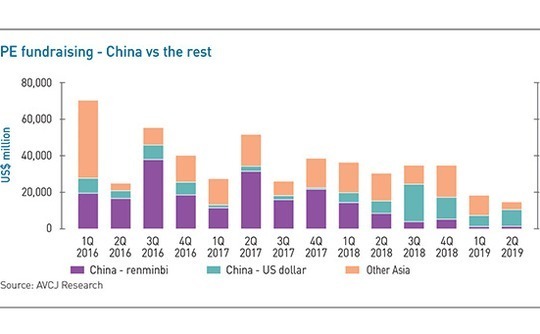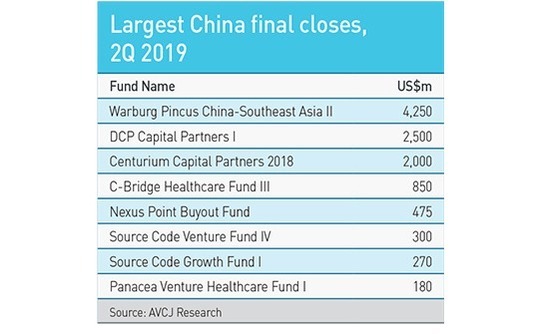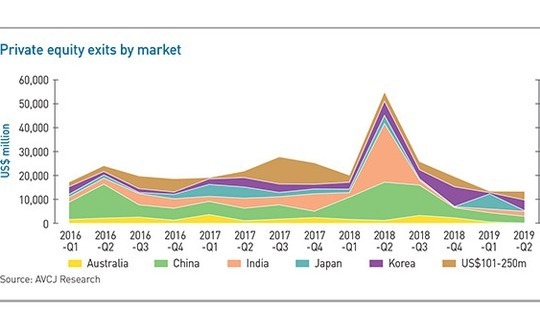
2Q analysis: Mixed fortunes
Second quarter analysis: Spin-outs reflect challenges for China fundraising; weak buyout activity continues to hold back Asia PE investment; Korea heads the exit charts as China falls back
1) Fundraising: Trouble in China
Four China spin-outs, three different outcomes. DCP Capital, Centurium Capital, Nexus Point Capital, and Rivendell Partners all launched in the past three years with reasonable fanfare. Led by senior executives from KKR, Warburg Pincus, MBK Partners, and The Carlyle Group, respectively, these Chinese private equity firms would leverage their size, nimbleness and deep local connections to secure deals that were beyond the reach of the global and pan-regional players.
Three of them achieved final closes between April and June, enabling China to avoid a streak of three consecutive quarters of fundraising declines. Total commitments they received in the final stages of their processes – plus the $4.25 billion raised by Warburg Pincus for a China fund that will make some deployments in Southeast Asia – account for three-quarters of all capital that went to China GPs in the quarter. This statistic, plus the experiences of these managers, say much about the current market dynamics.
DCP and Centurium both completed sizeable and rapid fundraises, each closing on $2 billion (with DCP collecting a further $500 million for a renminbi-denominated sidecar). Centurium moved through the gears especially quickly. It launched in March 2018 with a target of $1 billion and was close to capacity by the time of the first close three months later. The hard cap was set at $1.5 billion and then increased to $1.98 billion.
Both funds are of a size that appeals to large institutional investors such as public and corporate pension funds and sovereign wealth funds. They are also reasonably agnostic in deal structure, comfortable with control or significant minority investments.

Nexus Point and Rivendell were in the opposite position, targeting smaller funds for exclusively China mid-market buyout strategies. They fall below the minimum check size requirement for many of the biggest LPs and demonstrate that selling a control thesis when China doesn't have a long history of control deals is difficult. Nexus Point closed below target at $475 million. Rivendell, meanwhile, is said to be struggling to gain traction.
It is often said that raising $1.5 billion is easier than raising $500 million because the accessible LP universe is wider. Right now, though, almost any China fund appears to be a challenge. Anecdotal evidence suggests raising money out of the US has become harder as economic tensions with China prompt more questions from institutional investors, if not decisions to pull back.
Centurium stopped marketing its fund early in 2019 as the firm waited for certain LPs to finalize commitments. It's unclear whether these were hyper-cautious US investors, but it would be consistent with moves by several other GPs to extend fundraising periods. The nine partial or final closes for US dollar-denominated China funds represents an increase – by one – on the previous three months, but this trails the quarterly average of 14 in 2018.
Even as the private equity total increased, the $1.1 billion raised for China venture capital is the lowest in five years, propped up by Source Code Capital's $570 million across early-stage and growth funds. Renminbi fundraising also remains in the doldrums. The $1.3 billion raised is in line with the previous quarter, though the number of closes fell from over 100 to the low single digits. While the root cause of these difficulties differs from the US dollar space, the flight to quality is the same.

China's travails overshadow a bleak quarter for Asia private equity fundraising in general. In the first three months of 2019, commitments dropped below $20 billion for the first time since 2014.
Capital raised for the region came to $16.5 billion – the first time the total has dropped below $20 billion since 2014. It was a rude awakening after a quarterly average of $35 billion for the previous two years. April-June has been even worse, according to preliminary data from AVCJ Research, with a paltry $14.7 billion committed. Since 2011, the number of closes has fallen below 100 in only six quarters and it has never past 70. In the second quarter of 2018, there were fewer than 60 closes.
Of the region's major private equity markets, only Australia saw an increase in activity on the previous three months. That was almost entirely due to Pacific Equity Partners achieving a first close of $1.4 billion on its latest flagship fund.
2) Investment: Becalmed buyouts
Transactions arising from the restructuring of Lotte Corp. accounted for two of the four largest buyouts announced in the second quarter of 2019 as the Korean conglomerate's credit card and non-life insurance businesses were acquired by MBK Partners and JKL Partners, respectively. More pertinently, only five control deals appeared among the top 25 PE investments during the period – a similar number to the previous quarter, but down from 13 in the three months before that.
This helps explain why the buyout share of Asian deal flow remains relatively sparse. The first quarter total of $9 billion was the lowest in three years and the $10.1 billion posted for April-June represents scant improvement. PE investment across all deal types came to $31.1 billion, down from $34 billion in the previous quarter. The two-year quarterly average is $47.3 billion.
Three of the top five buyouts came out of Korea, with The Blackstone Group acquiring wholesale drug distributor Geo-Young Corporation for a reported enterprise valuation of $1.6 billion. It is Blackstone's first control deal in Korea – following a buyout debut in Japan in March – and reflects a general uptick in activity from the firm, which now has a dedicated Asian fund. Blackstone was also responsible for fifth-largest buyout in the quarter, purchasing Indian packaging player Essel Propack.

Korea and India saw the most private equity deal flow in dollar terms after China. Despite a sharp drop in VC activity – the $2.6 billion invested is the lowest quarterly total in eight years – China recorded transactions worth $11.2 billion. It represents an improvement on the previous three months but trails the boom period of 2017 and early 2018.
The largest deals were growth rounds for technology-oriented businesses, following a relatively quiet first quarter in this segment as investors tried to make sense of market volatility. The likes of JD.com's healthcare unit, artificial intelligence specialist Megvii Technology, and apartment rentals player Ziroom all secured rounds of $500 million or more. This suggests a continued conservatism in the market as the bulk of capital gravitates towards established and well-funded operators.
3) Exits: Korea comes to the fore
Korea seldom tops the quarterly charts for exit dollar value. Until 12 months ago, it had happened three times in 20 years. Yet the country led the way in the final quarter of 2018, accounting for about half of the 20 largest exits. And it repeated the trick in April-June 2019, generating $4.4 billion in proceeds, including seven of the top 20. There is no consistency to this pattern. For the quarter in between those two, Korea ranked fifth in Asia with proceeds below $550 million.
If anything, this phenomenon shows how unlikely geographies can come to the fore when China doesn't deliver, and exits are generally weak. This has been the case since the last quarter of 2018 when slowing growth, rising tensions with the US, and declining public markets created a wave of uncertainty that cut through dealmakers.
A total of $12.6 billion came from more than 30 China exits in the penultimate three months of 2018, boosting the two-year quarterly average to $7.8 billion. In each of the past three quarters, proceeds have failed to reach $5 billion. With China contributing just $2.8 billion, Asia-wide exits came to $13.3 billion in the second quarter, a four-year low. There were about 70 full or partial exits, the same as the previous three months. The total has fallen below 100 in each of the past three quarters, something not seen since the aftermath of the global financial crisis.

The malaise was spread across all exit types and across all major geographies bar Indonesia and Korea. The former market was buoyed by Temasek Holdings' sale of its position in Bank Danamon; the latter could point to billion-dollar trade sales involving Geo Young Corporation and KCF Technologies – exits for an Anchor Equity Partners-led consortium and KKR, respectively – as well as a clutch of public market sales.
The IPO picture, meanwhile, is improving. Nearly 30 private equity-backed offerings generated cumulative proceeds of $4.6 billion, more than double the previous quarter, though still well short of the two-year quarterly average.
China continues to drive activity, with $3.9 billion raised from 18 offerings, compared to $1.5 billion from 11 in January-March. Hong Kong was responsible for eight IPOs and about half the proceeds, but meaningful contributions came from the US and mainland exchanges as well.
That said, the trend of IPOs coming in smaller than their projected sizes, or being abandoned due to market volatility, continues. Pan-Asian logistics and fund management platform ESR was the most high-profile postponement, with the plug pulled after the pricing range had been set for a $1.24 billion offering. It coincided with protests in Hong Kong that rocked public markets, but the pricing was also seen by some as overly aggressive.
Latest News
Asian GPs slow implementation of ESG policies - survey
Asia-based private equity firms are assigning more dedicated resources to environment, social, and governance (ESG) programmes, but policy changes have slowed in the past 12 months, in part due to concerns raised internally and by LPs, according to a...
Singapore fintech start-up LXA gets $10m seed round
New Enterprise Associates (NEA) has led a USD 10m seed round for Singapore’s LXA, a financial technology start-up launched by a former Asia senior executive at The Blackstone Group.
India's InCred announces $60m round, claims unicorn status
Indian non-bank lender InCred Financial Services said it has received INR 5bn (USD 60m) at a valuation of at least USD 1bn from unnamed investors including “a global private equity fund.”
Insight leads $50m round for Australia's Roller
Insight Partners has led a USD 50m round for Australia’s Roller, a venue management software provider specializing in family fun parks.








